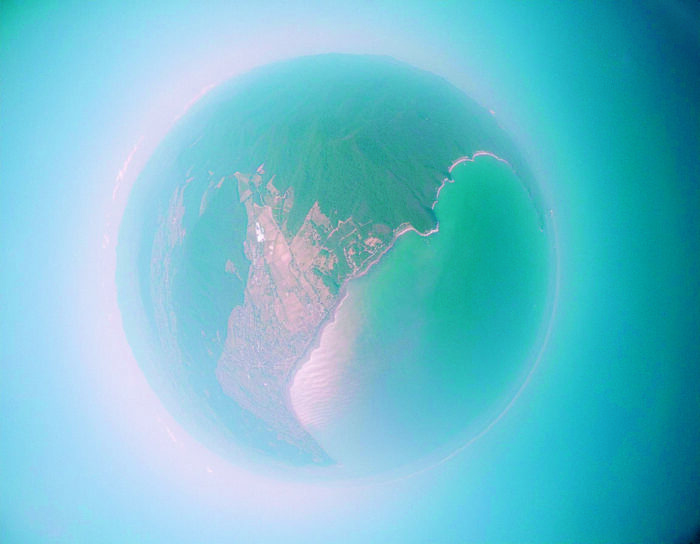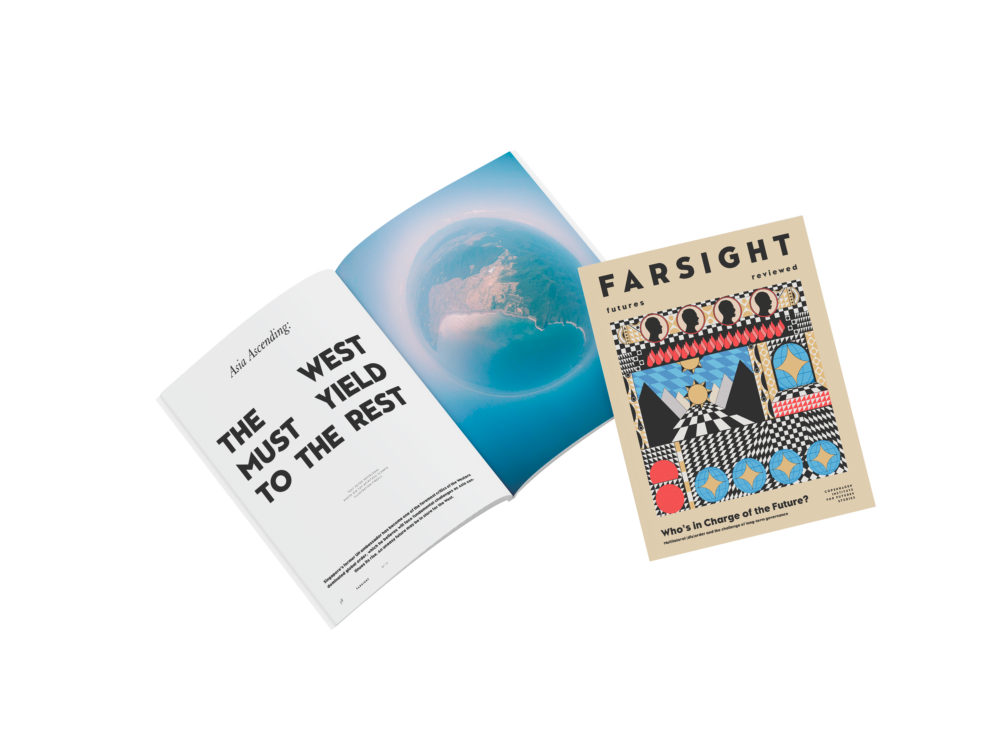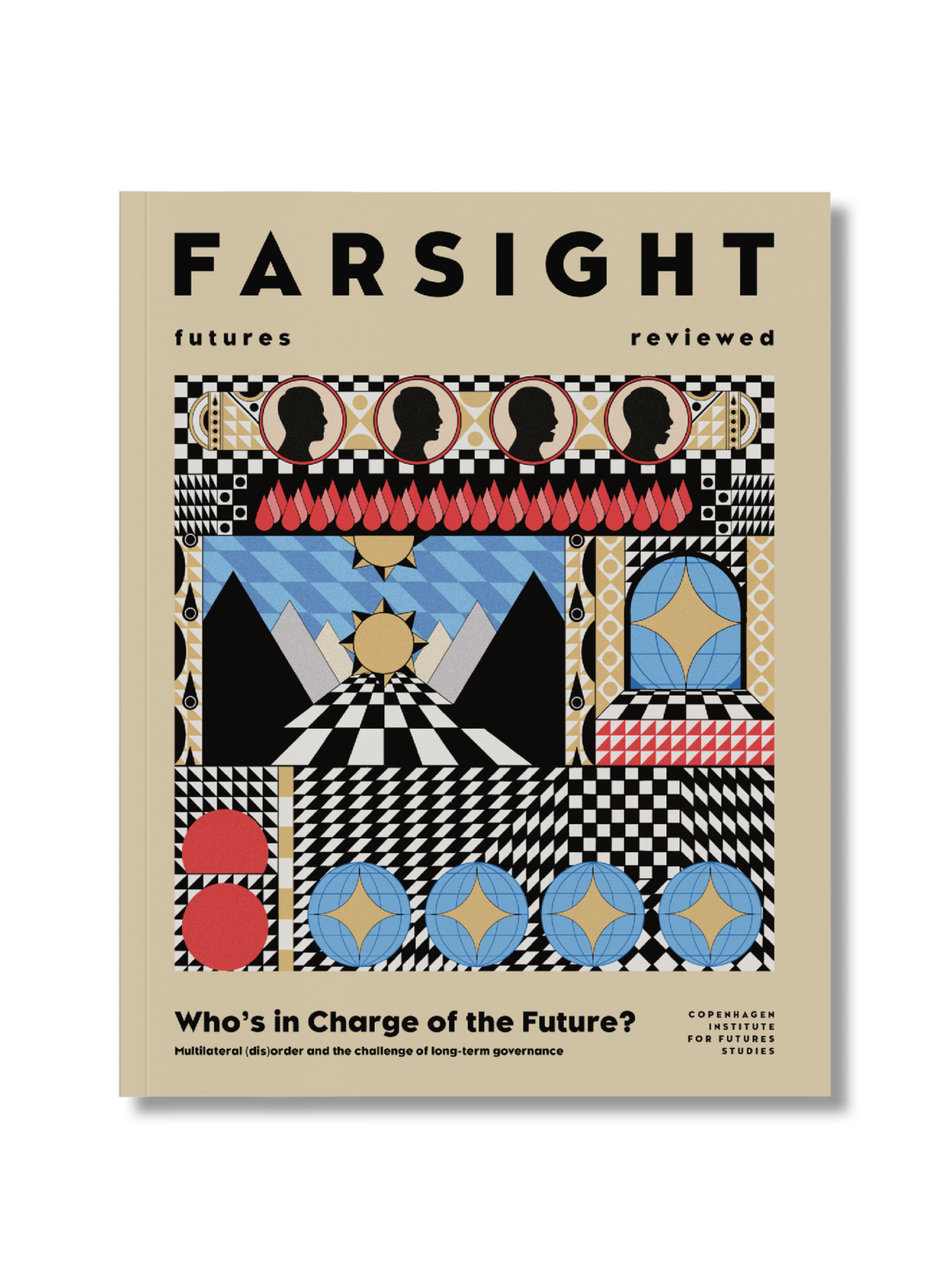
In turn, we use cookies to measure and obtain statistical data about the navigation of the users. You can configure and accept the use of the cookies, and modify your consent options, at any time.

A Q&A with Parag Khanna
Illustration: Sophia Prieto
The coming world order will feature increasing chaos, decentralisation, and fragmentation, says bestselling author and specialist in geopolitics and globalisation Parag Khanna. A passionate observer of world affairs, Khanna sees the future of governance as characterised by multialignment and regional collaboration supplanting past ideals of global multilateralism.
I recently came across an article of yours where you wrote that theories inaccurately observing the present will inevitably fall short of predicting the future. How do you think the underlying mechanisms of global governance are misunderstood today?
I think it’s important to distinguish between principles of governance and institutions of governance. People often conflate the issue with the organisation. For example, people will say “Well, without the United Nations Security Council (UNSC), how will we coordinate global security? Without the World Trade Organisation (WTO), how will we have global trade regulation? Without the International Monetary Fund (IMF), how will we have coordination around interest rates and currencies?”
The truth is all those forms of governance exist without any of the institutions. If the WTO disappeared tomorrow, you would still have well-coordinated global trade. If the entire United Nations disappeared – if you took a neutron bomb and eliminated it from the East side of New York – you would still have coordination among powers. Alliances, spheres of influence, diplomacy – these would all continue to exist.

Broaden your horizons with a Futures Membership. Stay updated on key trends and developments through receiving quarterly issues of FARSIGHT, live Futures Seminars with futurists, training, and discounts on our courses.
become a futures memberIssues pertaining to governance are important and existential, but the organisations are temporal and epiphenomenal. We have to see them as existing in a competitive landscape, where at any given time, there are many organisations competing to have a role in security, trade, finance, environmental management, migration management – you name the issue.
Governance is a perpetually competitive exercise. There is no post-war liberal international order that defines what the eternal standard of what global governance can and should be. After the Second World War, there existed a set of institutions that happened to be the dominant ones, yet they had no reflection of the actual underlying geopolitical order, which was bipolar and then unipolar. These multilateral institutions should not be seen as truly and globally regulatory, but suggestive and normative.
Well, what multilateral institution do you think best fits the standard of genuine global governance today? What’s the closest we have come to achieving it?
There is zero genuine global governance with teeth on anything, at all, on Earth today. I’m happy to challenge the reader to come up with an alternative account and name an organisation that is genuinely globally governing.
You might say the World Trade Organisation, in which there is reciprocity, an appellate court system, arbitration tribunal, and binding decision-making authority. However, as we can clearly see, it’s quite powerless when every country in the world wants to have industrial policies and trade tariffs. Also, the WTO is so successful that you don’t even need it anymore. Its binder – its codebook – is used as inspiration when countries want to create their own regional comprehensive economic partnerships. But as a physical institution? It could disappear tomorrow.
Let’s circle back to the UN, an organisation which I think best captures the ambitious spirit of international multilateralism. Although the UN was built in a specific post-WWII context and has shortcomings in attempting to capture the plurality of today’s global interests, don’t you think it is harsh to blanket multilateralism itself as superfluous? I mean, doesn’t there exist an alternative timeline where the UN reformed itself and began to globally govern ‘with teeth’?
There is a hypothetical universe in the aftermath of the Cold War where a constellation of great powers, led primarily by the United States, returned to multilateralism and supported global, centralised institutions that were independent of their own respective financial and diplomatic muscles. If you had a legitimate reform of those institutions to give greater weight to emerging powers like China and India, then you would’ve had a global concert of powers with a set of multilateral bodies mapped onto it, reflecting its consensus views.
That’s a fictitious reality. The best way to refute the scenario of genuine global governance is to look at the foundational psychology of most of the world. Most of the world comprises of postcolonial countries and post-Soviet republics, in a post-Cold War environment. Eighty percent of human beings on Earth have been through the Cold War and colonialism as victims and the suppressed – as pawns. Do you really think that they would cede their sovereignty to a far-off distanced body, any more than Washington would cede its sovereignty?
People who are most guarded of their sovereignty are those that have had it for the shortest amount of time. No one is inert anymore. The idea that ‘we’ do it and ‘they’ accept it has always been wrong.
You have also said that the coming world order will increasingly be characterised by ‘entropy’ – increasing chaos, decentralisation, and fragmentation. What kind of framework should we use to analyse global governance in the future?
If you start at the bottom up and inside out to reconstruct what global governance is, you’ll find that it is a thin veneer at best, which is thicker in some places and thin in others. Heavily state-driven in some places and more non-state, multistakeholder- driven in others. This flies in the face of conventional wisdom which always wants to view global governance as an ‘order’ – either a preexisting, God-given order or something bestowed by a unipolar hegemonic superpower. Pax Britannica, Pax Americana, and so on.
Well, let’s say I’m in Tajikistan. What does global governance look like from here? Is Tajikistan governed more by a sovereign federal government, or by a local tribe? To what extent is this governance influenced by Russia or by China? Does the IMF have a country office here? Is it receiving aid from the UNDP? Do remittances outweigh foreign aid?
That’s what governance looks like in reality – it’s a matryoshka doll.
The missing level of analysis in global governance is regionalism. The better part of global governance today is regional governance: North America, South America, Europe, Asia, they all govern themselves. You have a thin veneer of global governance on top of that, sure, but it doesn’t dictate to the regions. The regions dictate to it.
How do you think geopolitics will change to reflect this more competitive and decentralised global landscape?
The term I use is multialignment: the behaviour of countries in the geopolitical marketplace that don’t choose one side or the other, but rather, like Vietnam, are friendly with China, America, Russia, Japan, India, all at the same time. Singapore does it. Saudi Arabia does it. Brazil does it. All the smart countries are mutlialigning.
Ironically, the only situation where we could have borderless, global peace is one which necessitates more conflict. Countries would only begin to accept regional or global norms once wars have raged and local border disputes have been resolved.
As far as I understand, you believe that climate change and the ensuing mass migration are key in the rise of the entropic world order you sketch out. Why will climate migration be the final nail in the coffin for globally governing multilateral institutions?
Climate change and climate migration separately, and then together causally, are among the most consequential issues today and tomorrow. According to the In ternational Organisation for Migration, one third of migrants are climate migrants today. This will be the biggest test of global governance.
The issue is that there will never be any global governance of migration. You may have global governance of climate or conflict, but you will never have global governance of migration because it’s the ultimate affront to sovereignty. The one thing any country will never cede is the right to patrol its borders against the movements of human beings. That is the ultimate paradox of global governance – the areas you need it the most, you have it the least.
There is massive migration already occurring within and across regions. And yes, no doubt, the Global South to North is already one of these vectors of change. But this increase in migration doesn’t mean that a global regulatory approach will emerge. There will be a Canadian and American approach for people in Latin America, and a European approach to people in Africa – which appears to be to drown them to death. Then there will be a Russian approach to Indians and Chinese, which is to accept them suspiciously because of the labour dependency. So, you will have Greece drowning Africans and Japan providing nice clean housing for Indian software developers. Both will happen at the same time in this world where there is no global regulation.
I can’t imagine businesses seem particularly excited when hearing that our coming world order is going to be more and more entropic. We saw how Russia’s invasion of Ukraine and Covid-19 affected global supply chains. How can organisations prepare for this future of increased entropy?
Successful companies in a fragmented yet competitive global landscape arbitrage taxes, technology, and talent. What they will have to do is not act like multinationals, meaning an organisation with a home market and subsidiaries abroad. In a bumpy world, organisations will have to go local. They will have to go behind tariff walls and compete with local players. As an organisation, you will have to be more of a federation of national entities and regional chapters. That way, you are a local wherever you are, and through various financial and tax threads, you remain loosely connected. That’s the key to success in an entropic world.
Likewise, I can’t imagine the future you sketch out bodes particularly well for those working in multilateral institutions or the many adjacent organisations supporting them. What does the future look like for the UN in an entropic world order?
It depends. The question isn’t whether the UN re-tools itself. Instead, it’s what it would look like if we broke the UN into its 250 component entities and tried to figure out the future of each of them. What is the future of the World Food Program, the World Bank, the Department of Economic and Social Affairs, or the UN Refugee Agency?
The correct answer to your question is the sum-total of the future of all those agencies. I know that’s messy and difficult – but it’s accurate. Otherwise, you’re just playing Model United Nations, which is what a lot of people like to do in think tanks and academia. I grew up in this world where we would write policy papers, write organisational charts, and aspire to legitimacy and inclusiveness. We’d hope to have a cohesive and congealing multilateral architecture that everyone would obey.

Explore the world of tomorrow with handpicked articles by signing up to our monthly newsletter.
sign up hereBut since the United Nations is irrelevant today, then why would you even ask that question? Aren’t you much better off asking about the future of the African Union, European Union, Shanghai Cooperation Organisation, and BRICS? The UN is simply one of many hundreds of organisations where, depending on the issue and place, functionally or geographically, is ‘a’ player. It is not ‘the’ player, nor the central player, dominant player, coercive player, in anything. But, in an entropic world, no one is the dominant player.
In September 2024, the UN Office for the Secretary General hosted a Summit for the Future, which was tasked with integrating futures thinking and pushing for the representation of future generations in the policymaking of all 196 member states. Does the UN not play a role in promoting intergenerational fairness?
Quite frankly, it looks like a giant Model United Nations conference. It looks like a very silly kumbaya. It looks like the kind of thing where every penny which is going to be spent on it should be taken away and spent on coastal mangroves for countries in Africa suffering from the effects of climate change. That’s my view on the Summit for the Future. It’s not to have it.
When I mentioned at work that I would be interviewing you, a colleague described you as a ‘doomer’. To what degree are you being descriptive versus normative when sketching out this coming world order of entropy? Is it not only something you view as inevitable, but also outright desirable?
Well, your question is half teleology and half ideology. Let’s start with the teleology. I’m not necessarily teleological about the end state of the future I sketch out. I write a lot about systems evolution and complexity, and what characterises it is that the past is not a good guide to the future: system dynamics create emergent properties resulting in new phenomena that have not been seen before. So, I’m very true to the idea of a complex system which is perpetually unfolding in new directions. You simply cannot be teleological about it. My teleology is complexity. I’m going along for the ride, just like the rest of us. Not everyone can steer the ship, and we are all vulnerable to system dynamics. There is no one rigid pillar, a heliocentric model. Everyone is interacting and competing, and butterfly effects and chain reactions occur.
On the ideology side, I would say I am an accidental optimist. I see that we are building an endless amount of connectivity, and connectivity is a cause of complexity. When you have a connected world, you have so many flows, networks, and causal mechanisms playing out globally that it creates the system dynamics that are unpredictable. On the other hand, connectivity also creates resilience because it creates optionality and more pathways to escape, for goods to move, for data to flow, and so on.
I’m an accidental optimist in that we are building a more resilient world, despite all the complexity we have created. But it’s accidental, it’s volitional – this resilience is a byproduct.

Get FARSIGHT in print!